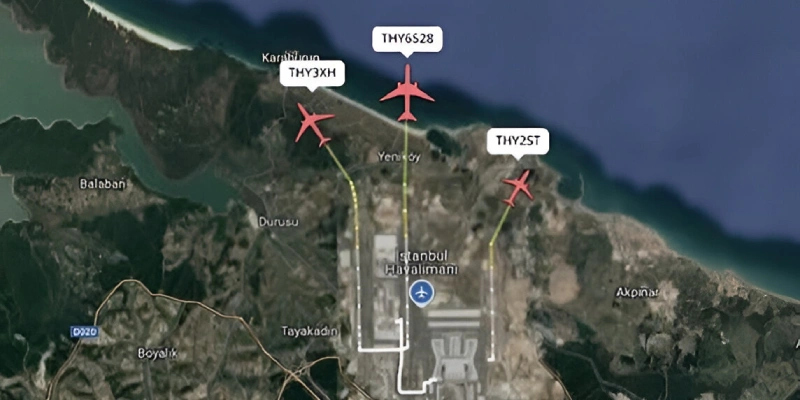This Thursday, April 17, 2025, iGA Istanbul Airport became the first in Europe to successfully implement the “Independent Triple Runway Operations” system. This innovation not only strengthens Turkey’s position as a key intercontinental hub but also redefines operational standards in global aviation.
From the control tower, the Minister of Transport and Infrastructure, Abdulkadir Uraloğlu, gave the inaugural order, allowing three Turkish Airlines commercial flights to take off simultaneously. This event marked a turning point for both the airport and European aviation.
Greater Capacity, Fewer Delays, and Reduced Emissions
Thanks to this new system, the airport has increased its operational capacity from 120 to 148 movements per hour, representing 28 additional operations every 60 minutes. This improvement not only reduces waiting times and delays but also contributes to lower carbon emissions by optimizing air traffic flows.
With three runways operating independently, iGA Istanbul is now capable of managing simultaneous takeoffs and landings, enabling more agile handling of both local and European traffic. The impact of this upgrade is direct: greater efficiency, an improved passenger experience, and tangible environmental benefits.
→ Top 10 Busiest Airports in the World in 2024: Atlanta Retains Its Crown, Shanghai Makes a Giant Leap
Turkish Airlines: A Key Player in the Success
Turkish Airlines played an essential role. Its extensive route network and operational capacity have significantly contributed to the system’s optimal performance. The airline, a symbol of Turkey, enhances global connectivity from Istanbul, elevating the traveler’s experience to the highest level.
On Course for 200 Million Passengers
This transformation aligns with an ambitious goal: enabling the airport to handle up to 200 million passengers in the future. The A-CDM (Airport Collaborative Decision Making) system is integral to this strategy. It improves traffic predictability, slot allocation, and runway efficiency, preparing the airport for upcoming challenges.
According to Mehmet Kalyoncu, a member of the iGA Istanbul Board: “This is not just a technical achievement but a strategic milestone. We are increasing our hourly air traffic capacity from 120 to 148 movements, enhancing efficiency not only for Istanbul’s airspace but also for Europe’s. Istanbul is no longer just a destination; it is a global aviation hub.”
Three Years of Preparation and Over 4,000 Hours of Training
The system’s implementation began in 2022 with meticulous planning involving the General Directorate of State Airports (DHMI), the General Directorate of Civil Aviation (SHGM), Turkish Airlines, Eurocontrol, and other international organizations.
During this process, 500 air traffic controllers completed 4,500 hours of training based on operational scenarios specifically designed for this new structure. The system relies on advanced radars, full integration with A-CDM, improved slot management, and digitally optimized taxi times.
Technology, Coordination, and a Vision for the Future
Coordination with Eurocontrol has been crucial to ensuring seamless integration with European airspace. Predictive analytics tools, real-time data, and advanced navigation enable control teams to make quick decisions and prevent runway conflicts, especially during peak traffic periods.
Moreover, the airport’s infrastructure was designed from the outset to accommodate this system, ensuring long-term sustainability and readiness for future demands.
iGA Istanbul has not only changed the game in Europe—it has set a new global standard.
Related Topics
JetSMART Requests Authorization for Lima-Bogotá Route
Copa Airlines Expands Capacity in Venezuela: 17 Weekly Frequencies Between Panama and Caracas Starting in March
Rutaca Airlines Resumes Flights Between Caracas and Punta Cana Starting in March
LATAM Suspends Lima-Havana Flights Due to Fuel Supply Crisis in Cuba

Plataforma Informativa de Aviación Comercial con 13 años de trayectoria.




